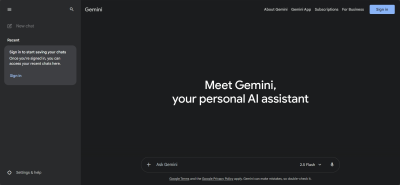About Google Gemini
Google Gemini, developed by Google DeepMind, is a state-of-the-art family of AI models built to push the boundaries of reasoning, creativity, and problem-solving. Unlike traditional AI systems that focus only on text, Gemini is designed to be multimodal—capable of understanding and generating across text, images, code, audio, and potentially video.
The Gemini models combine advanced natural language understanding with powerful reasoning capabilities, making them highly effective for tasks like coding, data analysis, research, and multimodal problem-solving. With tight integration across Google’s ecosystem (Search, Workspace, YouTube, and Android), Gemini is positioned as a core AI assistant for both individuals and enterprises.
Gemini offers different versions—ranging from lightweight models optimized for mobile and embedded use to large-scale enterprise-grade models for advanced workflows. Businesses can leverage Gemini for customer service automation, decision-making support, software development, and large-scale data interpretation.
As part of Google Cloud and Vertex AI integrations, Gemini empowers developers and organizations to create custom AI solutions with security, scalability, and compliance in mind. It represents Google’s most ambitious step toward building AI that is not only more powerful, but also safer, more reliable, and widely accessible.
The Gemini models combine advanced natural language understanding with powerful reasoning capabilities, making them highly effective for tasks like coding, data analysis, research, and multimodal problem-solving. With tight integration across Google’s ecosystem (Search, Workspace, YouTube, and Android), Gemini is positioned as a core AI assistant for both individuals and enterprises.
Gemini offers different versions—ranging from lightweight models optimized for mobile and embedded use to large-scale enterprise-grade models for advanced workflows. Businesses can leverage Gemini for customer service automation, decision-making support, software development, and large-scale data interpretation.
As part of Google Cloud and Vertex AI integrations, Gemini empowers developers and organizations to create custom AI solutions with security, scalability, and compliance in mind. It represents Google’s most ambitious step toward building AI that is not only more powerful, but also safer, more reliable, and widely accessible.
Pros
- multimodal capabilities (text, code, images, and more)
- advanced reasoning and problem-solving
- deep integration with Google ecosystem
- scalable across personal to enterprise use
- strong security and compliance support
- competitive with other top AI models
- designed for real-world business applications
Cons
- still evolving with some features in limited release
- potential accuracy or bias issues in responses
- may require paid Google Cloud/Vertex AI subscription for enterprise use
- integration-heavy for businesses already outside Google’s ecosystem
- requires clear prompts for best performance
Common Questions
What is Gemini by Google?
Gemini by Google is a high-end Artificial Intelligence model exhibiting Google's most advanced general AI technologies. It manifests multimodal abilities, allowing it to support diverse modes of artificial intelligence, thereby offering a comprehensive, interactive, and adaptable AI experience. This model is optimized for three different sizes - Ultra, Pro, and Nano, demonstrating Gemini's superior adjustability in accordance with varying needs and computing constraints.
What do you mean by Gemini being 'multimodal'?
Being 'multimodal' means that Gemini is capable of understanding, operating, and combining different types/types of information. This encompasses a broad spectrum, including but not limited to text, images, audio, code, and videos. This native multimodality enables Gemini to seamlessly analyze and process complex data from diverse mediums.
What are the different versions of Gemini?
Gemini comes in three distinct versions each optimized for different use cases. These versions are named Ultra, Pro, and Nano. The Ultra version is the largest and most capable, designed for handling highly complex tasks. The Pro version, though equally capable, is built for scaling across a wide range of tasks. Finally, the Nano version, which is the most efficient, is primed for on-device tasks.
What makes Gemini 'interactive' and 'adaptable'?
Gemini is 'interactive' and 'adaptable' in its ability to seamlessly understand, operate across and combine different forms of information namely text, code, audio, image, and video. This flexibility in dealing with varied data formats allows Gemini to handle a wide range of tasks and adjust its functioning according to the specific needs of the task at hand.
How does Gemini enhance Google's service performance?
While it's not explicitly mentioned which Google services use Gemini, it's stated that Gemini could potentially be used to enhance the performance of Google's suite of services. This implies that its advanced AI capabilities can be used to improve the efficiency, functionality, and user experiences offered by Google's various applications and platforms.
What does it mean that Gemini has 'broad spectrum' AI capabilities?
Gemini's 'broad spectrum' AI capabilities essentially refer to its ability to handle multiple forms of data, including but not limited to text, images, audio, and video. It also alludes to Gemini's capacity to tackle a wide variety of tasks effectively by leveraging these multimodal AI abilities.
Can Gemini be optimised based on my specific needs?
Yes, Gemini can indeed be optimized based on specific needs. The model is made available in three different versions: Ultra, Pro, and Nano, which allows users to choose and utilize the version that suits their specific requirements and computing constraints the best.
How does the Gemini AI model improve upon previous AI models?
Gemini builds upon previous AI models by offering multimodal capabilities, an extensive spectrum of AI functionalities, and adjustability based on specific requirements. It can process varied types of data like text, code, audio, image, and video, which is an improvement over previous AI models that might not possess such multimodal capabilities. Furthermore, it can be optimized in three different sizes, helping it to adapt according to varying needs and computational constraints.
How does Gemini improve on general AI models?
Gemini improves on general AI models through its advanced multimodality. It can understand, operate across, and combine different types of information - a feature not typically common in general AI models. Additionally, Gemini's design permits it to scale according to specific needs, thereby making it more dynamic and adaptable.
What makes Gemini a 'high-end' Artificial Intelligence model?
Gemini is referred to as a 'high-end' Artificial Intelligence model due to its advanced capabilities and groundbreaking features. These include its multimodal AI capabilities that allow it to process varied forms of data, the broad range of AI functionalities it provides, and its remarkable adaptability. Furthermore, being a Google product, it brings along the synonymy of quality, reliability, and innovative technology that Google is renowned for.
Why is Gemini considered Google's most capable AI model?
Gemini is considered Google's most capable AI model due to its advanced features like multimodal abilities and adjustability. It can process various types of information, making it versatile across a slew of applications. Additionally, its ability to be optimized in three different sizes Ultra, Pro, and Nano ensures that it can be tailored to suit specific needs and computing capacities, making it highly adaptable.
How does Gemini use multimodal capabilities?
Gemini uses its multimodal capabilities to integrate and understand different types of information. It can process and combine various forms of data like text, images, audio, and video, providing a comprehensive understanding of diverse inputs. This ability equips Gemini with the capability to reason, make decisions, or provide outputs based on a wider array of information and in a more contextual manner.
What does it mean that Gemini is a product of Google?
Gemini being a product of Google implies that it is a result of Google's continuous research and development in the field of AI. It represents the company's latest efforts in pushing the forefront of AI technology. Furthermore, as a Google product, Gemini may potentially be integrated within Google's suite of services to enhance their performance.
How significant is Gemini's adjustability based on specific needs?
Gemini's adjustability based on specific needs is a significant feature, indicating the model's flexibility and adaptability. This adjustability is facilitated by the availability of Gemini in three different versions, each optimized for certain use-cases. This means that users can choose between the Ultra, Pro, and Nano versions of Gemini depending on the complexity of the task, compute resources, and other specific requirements they have.
What impacts does Gemini have on computing constraints?
The influence of Gemini on computing constraints is demonstrated by its availability in three different sizes: Ultra, Pro, and Nano. This design allows the model to be adjusted based on the available computational power, demonstrating its adaptability. Whether a user has high-end computing capabilities or is limited, there is a version of Gemini optimally designed for their specific scenario, thereby effectively easing computational constraints.




